In this second installment of the 3 generative artists series, we have a look at another batch of accomplished artists and the pieces of advice that they give to aspiring coders. The overarching theme of this article is consistency and momentum: the journey to becoming a better version of yourself is woven in threads of persistency and deliberate effort.
We'll have a look at words of wisdom from Jared Tarbell, Tyler Hobbs and Kwame Bruce aka Studio Yorktown.
Jared Tarbell - Program Something Every Day
The first time I learned about Jared Tarbell's work, was while researching interesting generative algorithms and stumbling across his transcendent substrate algorithm:
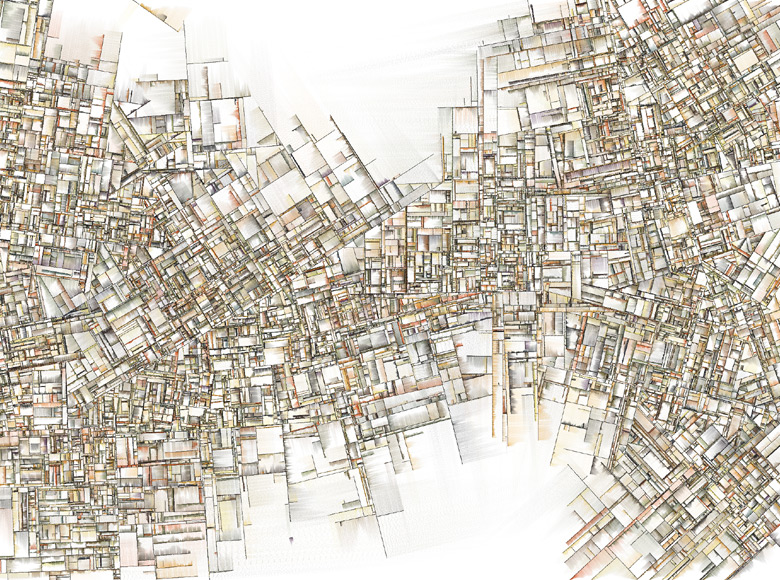
A very simple system, that can create intricate, mind boggling patterns. Till today, I think it is one of my favorite computer generated artworks. Jared Tarbell has been at it for decades, arguably pioneering a era of generative art at the start of the 2000s - Jared Tarbell hasn't done many interviews, but this one with Artnome is an insightful window into his character and process:

“How do you become a good programmer and create meaningful work?” My advice is always this. Just program something every day, even if it’s something simple. You can just do a little bit every day, even just 15 minutes.
I think that this is one of the best pieces of advice that you can give to someone that's just starting out. Slowly getting comfortable with writing code, making it an effortless process. The same way that writing in your native language probably isn't a big challenge. Making foreign symbols and statements become more and more familiar. Soon you'll notice that the difficulty shifts from writing code, to reasoning about underlying problems that you want to solve with code.
And not just for beginners; even if you're already a long way down the road, it helps keeping the gears oiled.
I remember doing something similar back during uni days. Every time that I'd encounter a difficult piece of code or reading in an assignment, I'd challenge myself to read it every day until the due date. The first couple of times I'd just be as clueless as if I hadn't read it. I don't know what exactly happens in my brain when I do this, new connections get established, neurons getting connected in new ways, some brain patterns getting reinforced. After a few rounds, I'd simply start to understand it a little better, until it'd finally click.
That was essentially my strategy for understanding the formula of the vanilla Fourier transform. By the end of it I felt that I had a much deeper understanding of it. It's one of the most fulfilling feelings to me, to understand something after breaking your head over it for several days and weeks at a time.
When you find things difficult, you just keep doing them until they're easy.
Here's another example. When I started working on the first couple of posts for this blog, it was a massive struggle. From trying to find topics to write about, to doing the research and acquiring the necessary knowledge to then adequately address these topics and somehow produce a relevant and meaningful piece of writing... being a "blogger" seemed like an insurmountable mountain.
Painstakingly typing in one word after another into the editor, re-reading whatever I'd written, finding that it was an incoherent mess of word vomit, rewriting everything from scratch several times over, then finally deciding that it was done - for better or for worse - and ultimately hitting that publish button with a mixed bag of self doubt and impostor syndrome.
And all of this many times over. I've gotten a lot more comfortable with the entire process at this point. But only because I've subjected myself to the process so many times. Behind the scenes, there also lies a big folder of posts, all in various states of completion, that will likely never see the light of day. But it wasn't a waste of time, each single one of them was a meaningful learning experience.
And naturally, it's the same when it comes to writing code and sketching. Maybe another way to frame this: it's about becoming comfortable with being uncomfortable. Building a habit, and automating some of the associated mental processes can a go a long way.
You’d be surprised how good of a programmer you are by the end of the first month of doing something like that.
Program something every day. Do it.
Tyler Hobbs - Putting in the Time
Sometimes the most daunting thing is sitting your butt down and getting started on that idea that's been living at the back of your mind like a little devil. Pestering you, wanting to be made real.
Beside Zach Lieberman, another one of my very first generative art idols was Tyler Hobbs. You probably know Tyler Hobbs as the creator of the pivotal generative blockchain project Fidenza:
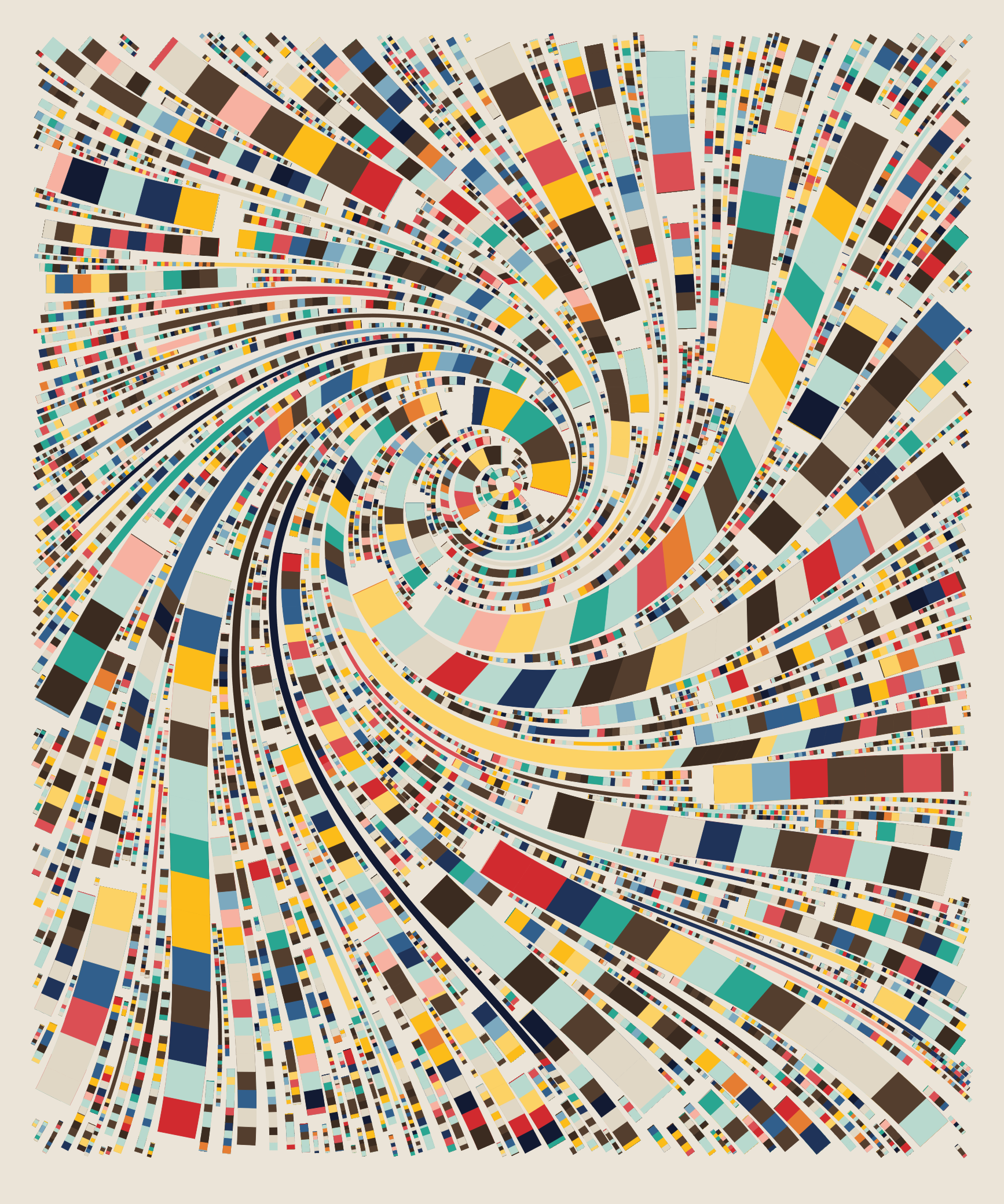
A piece of writing of his that had a lasting impression on me, was his essay titled Reflections on Five Years of Making Art Through Programming:

Every now and then I still find myself coming back to it, especially when I'm frustrated or stuck on some piece of code that doesn't seem to be going anywhere:
What I've been surprised to find is that "ideas" aren't really important. What is important is putting in time at the studio (or at the desk in your bedroom). When I physically make myself sit down and do something, new work comes out.
Many years ago I approached art in a completely different way than I do today. At that time I wasn't making any generative art, I was however actively trying to become a better musician. A big part of my daily practice routine back then, and arguably the most enjoyable and rewarding one, was trying to compose a little melodies. It's very similar to daily sketching actually - you come up with and idea and then you try to bring it to life as a visual or audible manifestation. There's a lot of parallels between the two, which is probably why I didn't find creative coding so foreign to begin with.
Well, where am I trying to go with this anecdote? Some days I'd come up with a relatively interesting tune imo, other days, I simply wasn't able to find that spark that led to an interesting sequence of notes. And on those days, I'd usually beat myself up over it, leaving me with a taste of disappointment for the rest of the day.
I can even start with a premise like "this will be garbage, and I'm okay with that". After two or three rounds of garbage, something neat from the spirit realm happens to appear on my paper or screen and then I know what to work on.
At the time, I didn't understand, that the quality of those ideas didn't really matter. What mattered was that I was actively trying to mould my ideas and turn them into reality. Practicing this process and getting better at it. A side effect of this is, that you're also getting the not-so good ideas out of the way, making space for new things. It's unreasonable to think that you're gonna make something interesting every time you sit down to create.
Ideas don't matter that much. What matters more, is spending time with these ideas, harnessing them, what potential they might hold, discarding them and moving on to other things if they don't work, returning to older garbage ideas, combining them with new garbage ideas and turning them into slightly less garbage ideas. You get the point. And this isn't just about generative art, it's applicable to every passion you have. It's about showing up, and putting in the time.
Bruce Studio Yorktown - Momentum, a hidden super power
Bruce has quickly risen to be a household name in the generative art scene, you might know him from his generative blockchain projects Sabler, Tesseract and more recently Perpendicular Inhabitation:
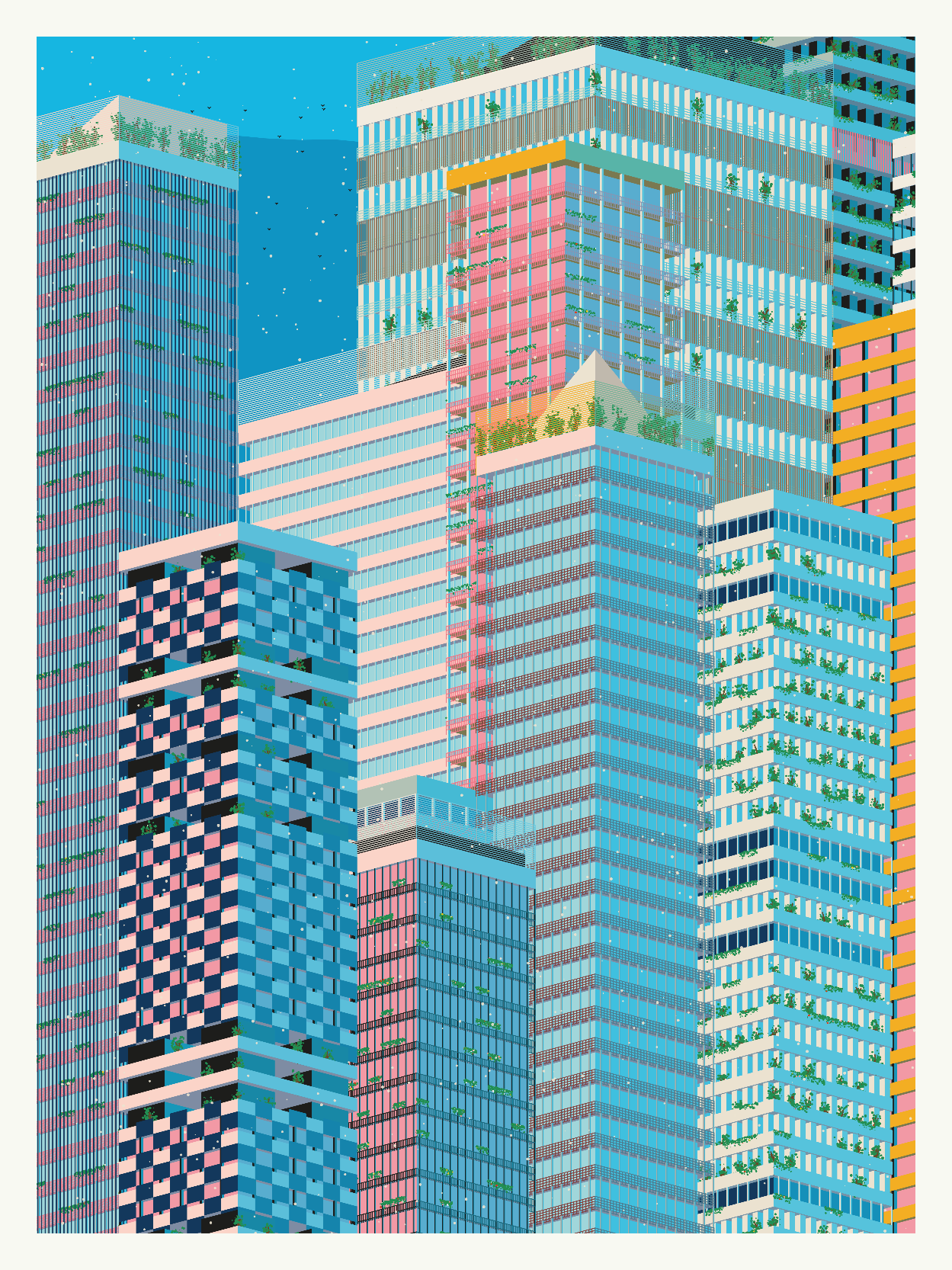
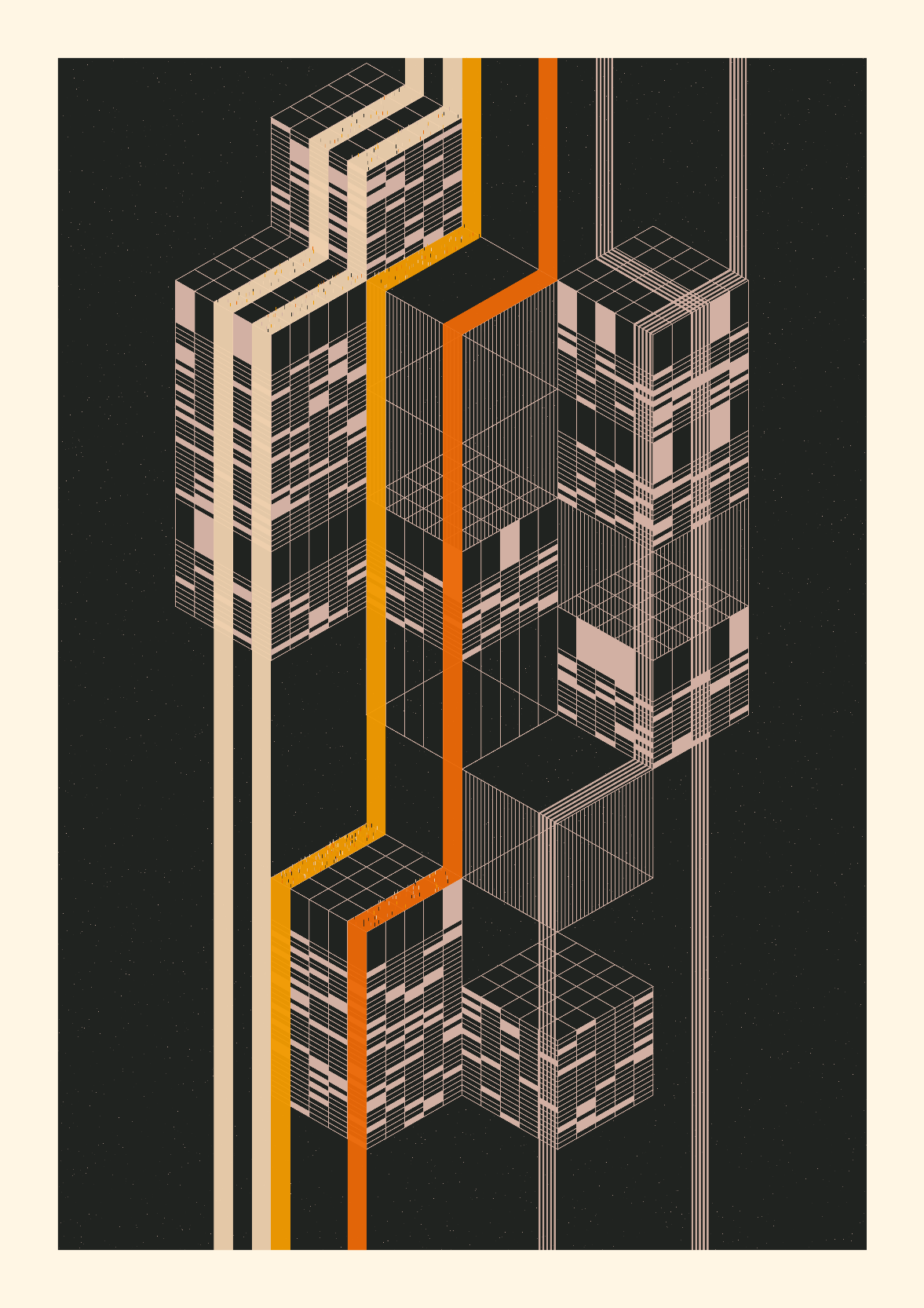
I really admire his work - not only the stunning outputs, but also the mindset behind them: the unwavering consistency of aesthetic coherency in his work is something I find really fascinating. It's an aspect that I struggle to capture in my own creative work.
Bruce often also shares his thoughts on his process, recently he posted this very insightful post:
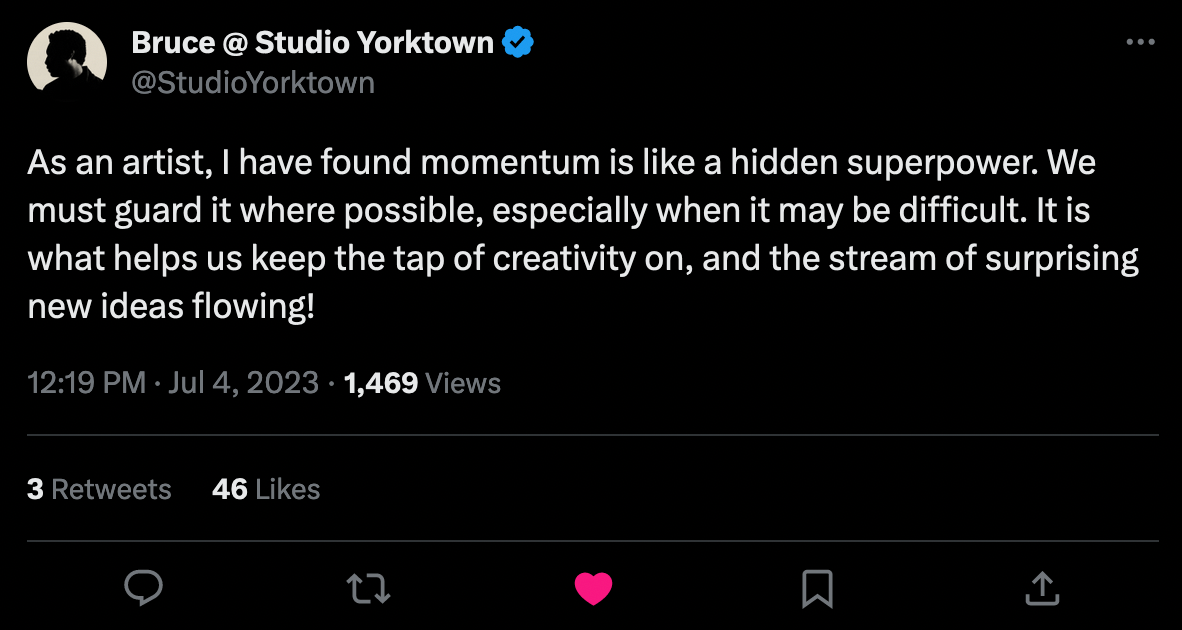
I can relate to Bruce's statement a lot. I find that I have moments where ideas are just flowing seamlessly, proliferating and spawning even more ideas. When these moments come, it's important to latch on to them, and not let them go to waste. I found that some of the magic of those moments can be stored in written form in a notebook, but it doesn't hit the same way.
Naturally, it helps to put yourself in a position from which it becomes easy to catch these moments of increased inspiration, and make it easy to convert them into meaningful work. I've found that I have a couple spikes throughout the day in which I'll get a lot more done than during the entire rest - and usually the work that I produce during those times is also qualitatively much better. For me, it's that one darned hour in the evening during sunset... and I'll be damned if I don't catch it.
Inspiration comes and goes in waves. And when that wave comes, you have to be ready to catch it.
Concluding Thoughts
To summarize all of the above: showing up every day, putting in the hours, and at the same time being mindful about the process is a good way to set yourself up for success. I can personally vouch that these pieces of advice work, be it for generative art, or other creative work, like writing or making music.
If you have thoughts on these topics I'd love to hear them, leave a comment or shoot me a message. Otherwise that's it from me, cheers and happy sketching! If you enjoyed reading this, consider sharing it on your socials or alternatively signing up to the mailing list and receiving updates whenever there's new content ~ Gorilla Sun 🌸


